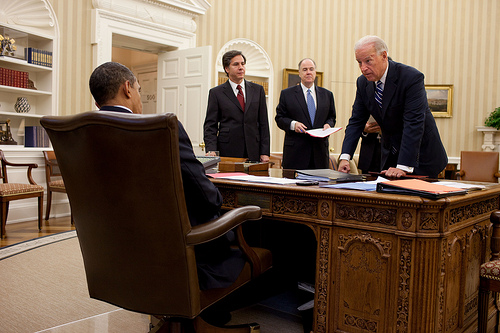![]()
Thu, dec 8, 2011 | Rubin Reports | by Barry Rubin

President Barack Obama talks with Vice President Joe Biden, National Security Advisor Tom Donilon, center, and the Vice President's National Security Advisor Antony Blinken, in the Oval Office, Nov. 4, 2010. (Official White House Photo by Pete Souza)
Obama Foreign Policy in A Brief: The President as Turkey
On October 5, 1938, Winston Churchill said in the House of Commons, regarding the Munich agreement in which Britain and France forced Czechoslovakia to cede the strategic Sudetenland to Germany, leading a few months later to that country’s extinction and a year later to World War Two:
“I will begin by saying what everybody would like to ignore or forget but which must nevertheless be stated, namely, that we have sustained a total and unmitigated defeat….”
Viscountess Astor shouted, “Nonsense!”
People ask me: How can U.S. government officials believe such silly and wrong things about the Middle East? Let’s go behind the scenes for a case study of how this works.
Here’s a November 28 transcript about Vice-President Joe Biden’s trip to Turkey and Greece. The main briefers are Biden’s national security advisor, Antony Blinken, and Special Envoy to the Organization for Islamic Cooperation Rashad Hussain.
The briefing shows the U.S. government’s bizarre love affair for Turkey’s Islamist regime, cluelessness about the “Arab Spring,” and disinterest in supporting Israel, contradicting the president’s frequent statements that he has done more for Israel than any predecessor.
For years the Kurdish Workers’ Party (PKK) has been waging war seeking a Kurdish state in southeastern Turkey. Apparently, the United States is getting increasingly involved in that war defined as, “Our assistance in the fight against PKK terrorism.” The U.S. government gave Turkey three SuperCobra attack helicopters and four Predator UAVs. Since that regime works closely with terrorist groups and Iran one wonders how secure this technology will be and how far U.S. involvement is going to go.
Has there been a serious discussion in the United States about becoming a partner in the Turkey-PKK war and what might Turkey be doing in exchange for U.S. help? This concept of getting something for giving something is pretty absent in the Obama Administration.
True, the Turkish regime has agreed to host a NATO radar system but only after grumbling a lot and imposing stringent conditions, especially that no intelligence be shared with Israel. And that’s no favor to the United States since, as the briefers note, Turkey is supposed to be a zealous member of NATO.
What else do you have, Blinken? Well, that Turkish government is visibly helping out a lot: in Afghanistan, Iraq, against the Syrian regime, in Libya, and Egypt. “So in many, many areas we’re working very, very closely with Turkey.”
Yes, but the problem is that the Turkish regime is working hard in those places to make itself leader of the region and to promote radical Islamism in all of those countries. In Egypt, Libya, and Syria for sure that means helping the Muslim Brotherhood, not to mention its work on behalf of Hamas and Hizballah.
Imagine if an American president in the 1970s had been besotted with Fidel Castro and explained how the Cubans were doing all that great work in Latin America.
Then the briefer throws out a cliché that means the exact opposite of what he thinks:
“Turkey has a very important story to tell as a country that can…set an example for other countries that are making transitions in the Arab world, in the Islamic world, in North Africa.”
But what is that example? The Turkish example used to be secularism, democracy, a lack of ambition abroad, a free enterprise economy, and a strong pro-Western orientation. That was the previous regime. The current regime likes Iran, Hamas, Hizballah, and the Muslim Brotherhood.
Turkey “has set an example” all right. An example of how radical Islamist forces can pretend to be moderate as they not only gain state power but do so with America’s blessing. It is a very terrible example.
There’s something naïve and dopey about Obama Administration briefers that reminds me of Occupy Wall Street spokesmen or a community organizer. Where’s the sharp-edged, worldly cynical, realist, the sense that threats and enemies are about, the what-have-you-done-for-me-lately sneer that is a part of any good foreign policy?
Remember that Turkey’s government voted against additional sanctions against Iran last year and tryied to sabotage them diplomatically. Erdogan has denied Iran is seeking nuclear weapons; Turkey is systematically violating anti-Iran sanctions.
“Turkey shares our goal of preventing a nuclear-armed Iran,” says the briefer. Perhaps that’s what Turkish leaders say but it has no relation to what they do.
But, asks a reporter, aren’t there some disagreements? Yes, says Blanken, and lists three: the United States wants more explicit human rights’ promises in the new constitution, the arrest of journalists, and the reopening of the Halki seminary.
That’s it. No mention of Turkish backing for Hamas and Hizballah; or violation of sanctions on Iran, or threatening war against Israel, or hundreds of people arrested and thrown into prison on phony conspiracy charges.
Blanken concludes:
“We have the kind of relationship with Turkey where we work very closely together on so many different issues across the globe, but where when we have disagreements we make them known in a spirit of respect.”
The word “respect” is important here. The Obama Administration is at pains to respect others, even when they step on its feet. It just doesn’t demand they respect U.S. interests.
When asked about Israel, Blinken says something else revealing, after the boiler plate on how everyone should get along:
“It pains us to see the two of them at odds because they’re both such close partners of the United States,” continuing with a plaint about why can’t everyone just get along.
Traditional briefers would say something like: The United States urges Turkey to act decisively to mend this relationship. Obama Administration briefers sound like bystanders, fearful of taking leadership or pushing for what U.S. interests require. And since they already make clear that the United States will give Turkey whatever it wants and thinks the bilateral relationship is great, nobody in Ankara will pay attention.
Biden is attending a conference in Istanbul on what Mr. Hussain terms, in Obama Administration community organizer-speak, “economic and social entrepreneurship.” He opines:
“We’ve seen certainly throughout the Arab Spring that entrepreneurs have been at the forefront of pushing the envelope when it comes to change within societies….”
Really? Here’s a U.S. government wrecking entrepreneurship at home with high taxes and regulations. What does it have to teach the Third World? Moreover, I have not heard one word in any of the Arab rebellions about reducing strangling statism there.
In this case, at least, the reporters didn’t just roll over and play dead. One asks:
“The administration is clearly supporting Erdogan, even with military assets…although he’s an Islamist [and only] conditionally supportive of democracy….He supports the bigots in Hamas. So what are you asking in return for giving our support to this local leader? What do we get in return for all this?”
On the points raised, Blanken has nothing to say.
Another reporter asks,
“Would you just address this narrative…that Erdogan’s government is Islamist and looking east rather than to its old friends and NATO to the west and sort of spinning out of our sphere of influence and towards Iran and some of the other regimes in the neighborhood.”
No, Blanken just doesn’t get it and is incapable of addressing that “narrative” (also known as “reality”)’:
“I think it’s fair to say that Turkey has always looked to the east and the west, given its position in the world both geographically and geopolitically just as I might add the United States looks both to the Pacific and to the Atlantic. In that sense, it’s quite similar.”
Nope, that’s not what the reporter asked and also no before the current Islamist regime Turkey didn’t look east to Hamas, Hizballah, and Iran. The journalist’s asking if Turkey has changed sides. Blanken can’t and won’t deal with a huge flaw in U.S. policy. This is Obama Administration style: it is totally doctrinaire and is deaf to criticism, not even bothering to construct a cogent argument in respose. That’s the perfect formula for marching off the cliff, and taking all of us with them.
Here’s the bottom line: “[Turkey’s] example can be very powerful to countries now going through transition. So it’s very encouraging to see Turkey play a strong leadership role.”
Yes, that’s it. Turkey’s Islamist regime, not the United States, is taking leadership and setting the example. It’s leading in an anti-American direction and setting a bad example. American interests are being trashed; American allies are in despair.
Now multiply this example by a few hundred times and you have Obama foreign policy.



 RSS
RSS










Obama Foreign Policy in A Brief: The President as Turkey | Middle East, Israel, Arab World, Southwes http://t.co/bQgEXPwK
Obama Foreign Policy in A Brief: The President as Turkey | Middle East, Israel, Arab World, Southwes http://t.co/bQgEXPwK